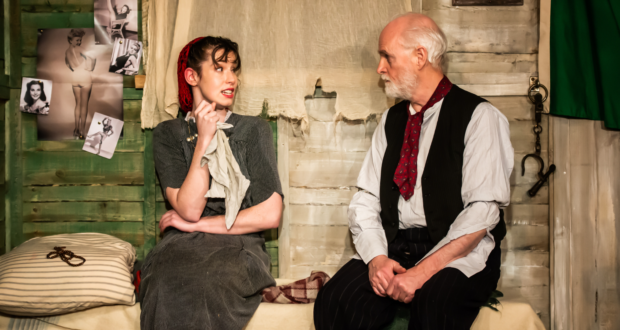A typical dark Irish humour underlines some serious points, with a striking contemporary relevance.Summary
Rating
Excellent
It is 1941 and the Second World War rages: but not in Ireland. In Ireland it is ‘The Emergency’ and the country is officially neutral. To this day there is still controversy and debate about Ireland’s neutrality in World War II. This debate is back at the forefront in Ireland following the recent invasion of Ukraine. Dev’s Army is set in amongst these complexities.
The play is set at a small wooden hut, used as a base for lookouts, on the east coast of Ireland. There are three men assigned to the hut; the old hand, Paddy (Paul Murphy); the seasoned Irishman who fought in the British Army in WW1, Dermot (Nick Danan); and the young naive, and a bit of an eejit, Michael (Eoin McAndrew). Paddy questions what the Germans have ever done to Ireland compared to the British, and Dermot – well Dermot might not even be sure that he supported an Ireland outside of the British Empire. These feelings are strongly ingrained and Michael finds himself in the middle, unsure of which man he agrees with at which moment. The humour is cutting and dark, used effectively to underline serious points, whilst the performances are excellent, with an obvious chemistry between the men stationed at this hut.
When an explosion rocks the base and an unconscious woman – almost certainly not named Betty Pope (Niamh Finlay) – is found washed up on the beach, the story changes and moves from a dark comedy to a thriller. We never find out her real name, but the reasons for the explosion and her appearance move the arguments from the theoretical to life and death and, as has so often been the case with Irish history, violence occurs.
Author Stuart D Lee uses the comedy and the banter between these three men to investigate the conflicting Irish attitudes of the time but also how those same arguments might be still viewed today. Helen Niland’s direction works well to allow the cast to transform the three men’s interplay into interrogation of serious topics.
A quick word of praise for Phil Newman who designed the set, and whose work is excellent. The hut looks great, and it is quite striking on walking into the room, especially in a small pub theatre.
Dev’s Army is dark and funny and very Irish. You don’t have to be Irish or to have a grasp of Irish history – the writing is smart enough to explain as it goes along, but I do think an Irish audience will find a little more to appreciate. Given current world events, many of the questions this play poses about Ireland’s neutrality have a new level of resonance. For everyone else, there are four great performances, a lot of laughs and a surprise or two along the way.
Written by: Stuart D Lee
Directed by: Helen Niland
Designed by: Phil Newman
Produced by: Strange Fish Company
Dev’s Army plays at Bread and Roses Theatre until 19 March. It will also play for one evening (24 March) at London Irish Centre
 Everything Theatre Reviews, interviews and news for theatre lovers, London and beyond
Everything Theatre Reviews, interviews and news for theatre lovers, London and beyond



